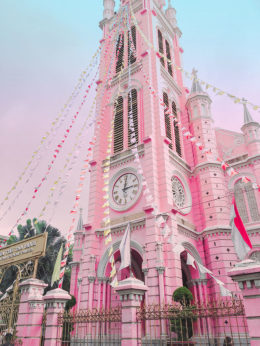
Recently, the U.S. Department of State issued a report in which they claimed that religious freedom is being suppressed in Vietnam. The Vietnamese government is of course capable of speaking for itself and responding to this defamation. However, I think that Americans also have a responsibility to speak out against baseless claims made by our reactionary government. And as an American living in Hanoi, I can tell you—this is a baseless claim indeed.
Anyone that has spent any time in Vietnam can plainly see the evidence right in front of their face that accusations about a lack of religious freedom are lies. Walking around the capital city, there are Buddhist pagodas, temples of various sects, a mosque, and even a Chabad House Synagogue. Even though Christians make up a small minority of the population of Vietnam, on Christmas Eve the streets in front of the city’s churches are packed with worshippers and friendly onlookers listening to the music and enjoying the celebration alongside their fellow citizens.

There are also 53 indigenous ethnic minorities in Vietnam, each with their own traditions and many with their own religious beliefs and ways of practicing their faith. These different peoples are celebrated by the Vietnamese government and the Vietnamese people. There are museums dedicated to honoring them and celebrating their diverse traditions and cultures, including their religious beliefs.
The Vietnamese government also works with—not against—religious leaders throughout the country in times of national crisis. During the height of the COVID-19 pandemic, for instance, it was a common sight here in Vietnam to see monks and other clergy helping distribute government-subsidized food to people that were in quarantine.
Freedom of religion is enshrined in Article 24 of the Constitution of the Socialist Republic of Vietnam. The article has 3 points:
1) Everyone shall enjoy freedom of belief and religion; he or she can follow any religion or follow none. All religions are equal before the law.
2) The State respects and protects freedom of belief and of religion.
3) No one has the right to infringe on the freedom of belief and religion or to take advantage of belief and religion to violate the laws.
We must ask ourselves, why does the U.S. State Department want to slander Vietnam? Is it simply another round of old fashioned anti-communist disparagement? Are the Republicans in power trying to appeal to their evangelical voter base that fantasizes about a Christian nationalist U.S. foreign policy supposedly aimed at spreading the faith and protecting persecuted Christians (despite the fact that there is no evidence of this in Vietnam)?
Whatever the motivation for the false accusation, one can only be astonished that the U.S. government would choose now to claim that Vietnam, of all countries, is not protecting the human rights of its citizens.
While the U.S. federal government has so thoroughly botched the effort to protect U.S. citizens during the worst pandemic of the last century, Vietnam has made every effort to protect its citizens, and has done so with great success. The U.S. is seeing mass protests and mobilizations right now to protect people of color from police murder in the streets. Juxtapose this with the Vietnamese police that were sent out to deliver masks and food, often alongside religious figures, as mentioned above.
The utter hypocrisy of the U.S. State Department attacking Vietnam with fabricated accusations is outrageous and should be called out and condemned.
As with all op-eds published by People’s World, this article reflects the opinions of its author and not necessarily those of the Editorial Board and Staff.












Comments